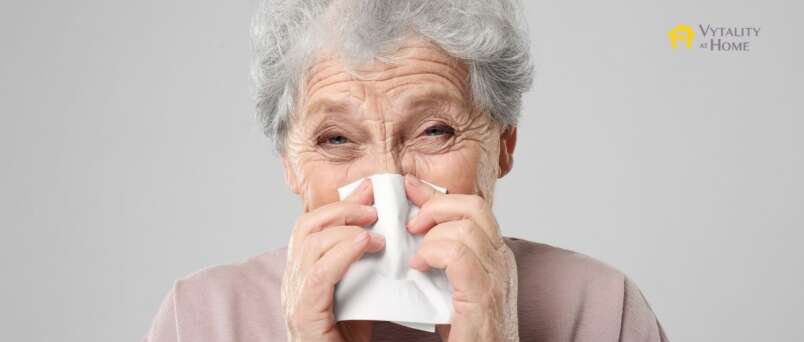More than just sniffles and sneezing: seniors and hay fever seasons
Let’s start with a myth buster: seniors can and do suffer from hay fever. Older people do suffer from hay fever less often than those in their teens, but around 3 seniors in every thousand seniors are still affected. In addition, if you already suffer from asthma, it’s likely you also have some degree of seasonal allergy too (75% of asthmatics do).
Know your nose
As we age, structural changes happen in our noses, which means we are more likely to get rhinitis (inflammation of the nasal passages)) more often. According to one medical journal article:
“Structural changes in the nose with age include atrophy of the collagen fibers and loss of elastic fibers in the dermis. Weakening of the upper and lower nasal cartilage, retraction of the nasal columella, and downward rotation of the nasal tip contribute to an increase in nasal airway resistance.”
The lining of our nose also becomes dry, and your mucous glands slow down, resulting in a ‘stuffy nose’ due to thicker mucous not being cleared even if you don’t have a cold or hay fever.
What is hay fever?
Allergic rhinitis (hay fever) is when our immune system reacts to allergens in our environment resulting in an allergic reaction. Hay fever causes inflammation of tissues in the nose, resulting in sneezing, a runny nose and post-nasal drips. The inflammation may also obstruct the flow of air from nose to lungs, which can be an issue for those who already have a respiratory condition, heart failure or chronic obstructive pulmonary disease (COPD). It can also trigger conjunctivitis which makes our eyes itchy and watery.
Hay fever seasons
In late April to May, levels of tree pollen peaks, causing hay fever symptoms for those allergic to pollen from trees including:
- Ash
- Birch
- Alder
- Elm
- Pine
- Maple
- Cottonwood
- Oak
Here in Calgary, March saw the start of ash, alder, poplar, plane, elm, mulberry and maple tree pollen. In May, pine, alder and other later tree pollens are joined by early grass pollens and then ragweed. By July, most tree pollen has gone, and by September, both grass and tree pollens have practically stopped. In addition, snow melt can trigger the release of spores, which can also cause allergic reactions.
Different levels each year
Trees also produce more pollen some years than others, depending on how the growing conditions were the previous year, when the pollen was being set in the tree buds. In addition, if you’re sensitive to one particular tree, such as birch, you’ll probably also be allergic to pollen from trees in the same family of plants, such as alder.
Hay fever medicines
It’s important to seek treatment of seasonal allergies if they are causing you discomfort at any age. According to Asthma Canada:
“Effective treatment of seasonal allergies can reduce asthma symptoms and may even help prevent the development of asthma.”
You should always consult your physician/doctor before taking any medicines for hay fever, even if you have taken them before. Whilst second generation antihistamines have been shown to be effective in seniors, they might contradict with other medications you are already taking. The side effects of hay fever medications can also be more severe for seniors.
Less pollen, less reaction
One of the most effective ways to reduce your hay fever symptoms is to lessen your exposure to pollen.
- Avoid going out to parks of other places with lots of trees, grass and flowers, especially around midday when the pollen count is still rising
- Wash your hands, clothes and hair if you’ve been outside in a high pollen count area
- Use air conditioning, an HVAC system or a HEPA purifier to filter out pollen from outside, rather than open a window
- Switch on the air con in your car rather than drive with open windows, for the same reason
- Download a weather app or similar that monitors the pollen count in your area and avoid outside activities on high or very high pollen count days
- Dry your laundry in a clothes dryer rather than outside where allergens can stick to wet laundry
Home care and hay fever
For seniors who need to stay indoors most of the day, loneliness and isolation can become an issue. Regular visits from our home care caregivers can provide much-needed companionship, cognitive stimulation, some light housekeeping, and even just a chat.
For more details and to discuss home care in Calgary for yourself or a loved one:
DISCLAIMER: This article is for general information purposes only and is not intended as a substitute for professional medical advice. Please consult your physician / health care provider if you have any questions about your health.




